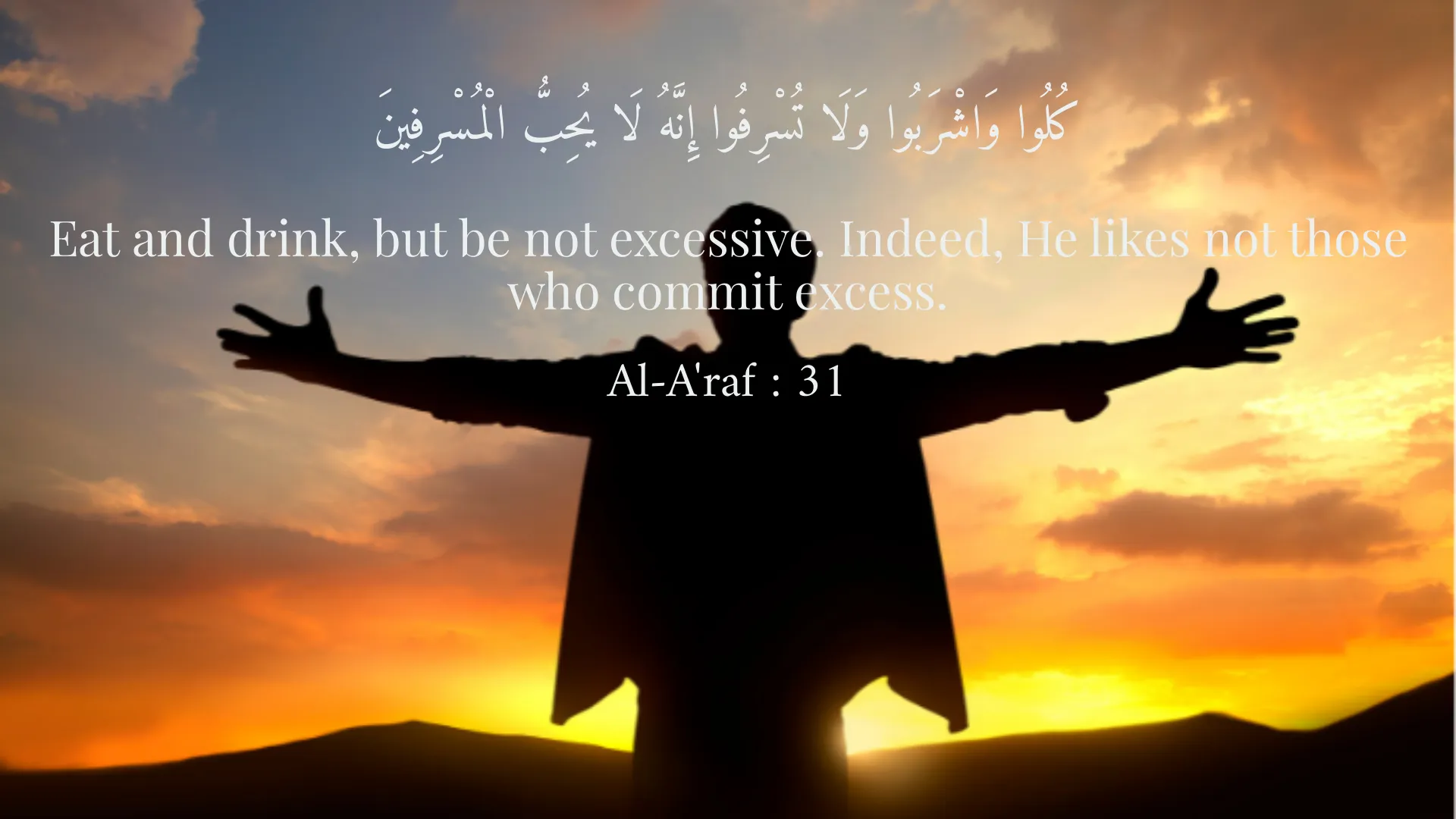Quranic Answer

The concept of moderation has long been advocated in various cultures and religious teachings, but one of the strongest endorsements of temperance can be found in the Holy Quran. Allah cautions believers against extravagance and underscores the importance of living a life grounded in moderation. In Surah Al-A'raf, verse 31, it is stated: "Eat and drink, but be not excessive. Indeed, He likes not those who commit excess." This particular verse highlights that any form of extravagance, especially in terms of consuming food and resources, is not only discouraged but also explicitly condemned by Allah. The clear message is that moderation in our eating and drinking habits is a virtue that we should aspire to uphold. The principles of moderation can be extended beyond diet to encompass various aspects of life, most notably in our spending habits. In Surah Al-Furqan, verse 67, the Quran describes the qualities of true servants of Allah by stating: "And those who, when they spend, are neither extravagant nor stingy, but are ever, between that, [justly] moderate." This verse elucidates that genuine believers find a balance in their financial conduct; they spend wisely without falling into the pitfalls of wastefulness or excessive frugality. This principle of balanced spending encourages Muslims to adopt a realistic approach towards their finances, making it clear that one can enjoy the blessings of life without succumbing to excess. Financial planning is essential in promoting and achieving financial moderation. The foundation of financial planning lies in budgeting, which involves tracking income and expenses to ensure that one's spending aligns with their financial goals. By establishing a budget and adhering to it, individuals can significantly mitigate the risk of falling into excessive spending. Budgeting allows one to distinguish between needs and wants, which is a critical aspect of avoiding extravagance. Identifying priorities is another vital element in curbing excessive spending. Each individual should make a conscious effort to evaluate their needs versus their desires continuously. This reflection helps in building awareness of what is truly essential. For instance, one might feel the urge to purchase luxury items, but upon reflection, they may recognize that their basic needs can be met without resorting to high-cost indulgences. By focusing on fulfilling genuine needs, individuals can decrease the frequency of superfluous purchases and thus maintain a lifestyle rooted in moderation. It's also imperative to understand that extravagance is not merely about spending excessively; it extends beyond financial limits and influences various areas of life. For instance, spending lavishly on social events, decorating homes with extravagant items, or consuming beyond one’s capacity can all be manifestations of extravagance. The Quran’s consistent emphasis on moderation serves as an essential reminder for individuals to reflect upon their values and priorities consistently. Living moderately promotes not just personal well-being but is also beneficial to the broader society as it encourages sustainable consumption patterns that positively impact the environment and social dynamics. Furthermore, the virtue of moderation suggests that self-control and discipline are critical components of a well-balanced life. In a world bombarded with advertisements and marketing strategies that encourage excessive consumption, the ability to exercise restraint becomes crucial. By cultivating self-discipline, individuals strengthen their resistance against societal pressures to conform to consumerism. Ultimately, through practicing moderation, individuals can cultivate a more fulfilling lifestyle founded on gratitude and contentment with what they have, rather than the relentless pursuit of more. In various cultures around the globe, the ideals of moderation resonate with the very fabric of societal values. Many ancient philosophies advocate for simplicity and restraint, emphasizing their benefits to both personal development and community welfare. Acknowledging these teachings reveals that moderation is not merely a religious or cultural teaching but a universal principle that can enhance personal lives and contribute towards the betterment of society. In conclusion, the principles laid out in the Holy Quran serve as timeless wisdom that urges believers to eschew extravagance in their eating habits, spending, and overall lifestyle. By focusing on moderation, individuals can not only fulfill their basic needs but also contribute to a harmonious society through responsible consumption. The wisdom found in the verses of the Quran advocates for a balanced approach, blending enjoyment and restraint. Thus, as we navigate our daily lives, let us heed these teachings and strive to be mindful stewards of the resources bestowed upon us.
Related Verses
كُلُوا وَاشْرَبُوا وَلَا تُسْرِفُوا إِنَّهُ لَا يُحِبُّ الْمُسْرِفِينَ
Eat and drink, but be not excessive. Indeed, He likes not those who commit excess.
Al-A'raf : 31
وَالَّذِينَ إِذَا أَنفَقُوا لَمْ يُسْرِفُوا وَلَمْ يَقْتُرُوا وَكَانَ بَيْنَ ذَٰلِكَ قَوَامًا
And those who, when they spend, are neither extravagant nor stingy, but are ever, between that, [justly] moderate.
Al-Furqan : 67
Short Story
Once upon a time, there was a young man named Masoud who was pondering his choices. He realized that he had been overspending and indulging in extravagance. Upon reading the verses of the Quran, he came across one reminding him of the virtue of moderation. From that day forward, he decided to maintain moderation in his expenses and avoid extravagance. This decision transformed his life, leading him towards tranquility and satisfaction.